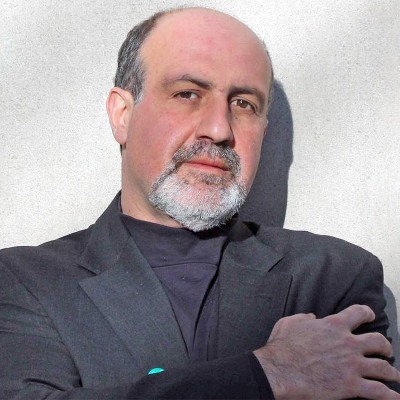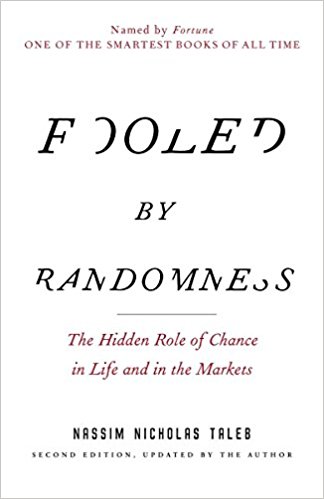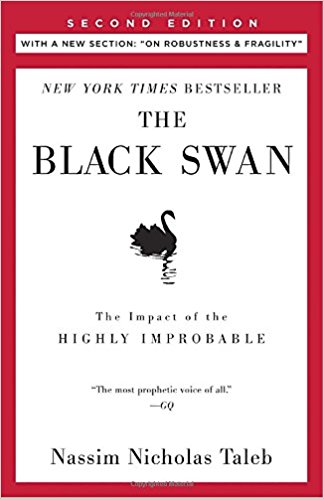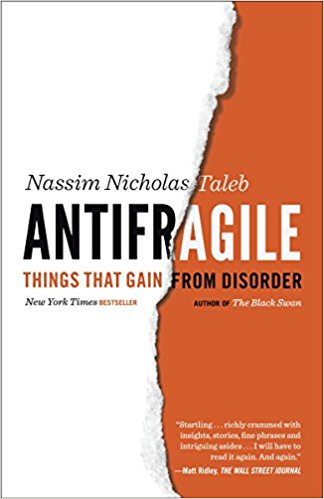Nassim Nicholas Taleb – A Journey of 100 Steps
8 min read ⌚
Love him or hate him, Nassim Nicholas Taleb is one of “the world’s top intellectuals” and maybe even “the hottest thinker in the world” right now. Notice the quotations: Bryan Appleyard, a noted journalist, remarked the latter, and Daniel Kahneman, a Nobel laureate, claims the former.
‘Nuff said, ha?
Well, we’re just gettin’ warmed up!
Who Is Nassim Nicholas Taleb?
 At the 2009 World Economic Forum annual meeting in Davos, there were some, well, let’s just say, pretty recognizable faces.
At the 2009 World Economic Forum annual meeting in Davos, there were some, well, let’s just say, pretty recognizable faces.
And by “pretty recognizable faces” we mean the leaders of the free and the not-so-free world: Wen Jiabao, Vladimir Putin, Angela Merkel… You know: the people who basically control your life.
Speaking of which: there were also bankers. Numerous, numerous bankers. It was 2009, after all – the year of the big short, the year after the flood.
However, the real “rock star” of the event was a Lebanese-American statistician and scholar, who, in fact, had all but predicted the financial crisis of 2007-8 in his 2007 book, “The Black Swan.”
His name: Nassim Nicholas Taleb.
His post festum verdict – by the way, uttered in Davos in his recognizable irreverent manner – it was long overdue! “I’m happy that Lehman Brothers collapsed,” he added afterward, inspiring one or two death threats at his address. “irresponsible bankers and reckless Wall Street traders should have been punished long time ago.”
As you know, in the end, they weren’t. Because many were bailed out in the following years by the U.S. Treasury in a “too big to fail” frenzy.
Ever vigorous and sacrilegious – not when it comes to religion, though – Nicholas Taleb hasn’t backed out of his crusade. In his last book, “Skin in the Game” he wags his finger high above his head and then points it in the direction of one person, the synecdoche of evil: Robert Rubin.
“Nobody on this planet represents more vividly the scam of the banking industry,” claims Taleb. “He made $120 million from Citibank, which was technically insolvent. And now we, the taxpayers, are paying for it.”
And no – that’s not the end of his tirade!
“He represents everything that’s bad in America,” Nassim Taleb adds. “The evil in one person represented. When we write the history, he will be seen as the John Gotti of our era. He’s the Teflon Don of Wall Street.”
My god – that’s a lot of hatred directed towards one man! But, hold your horses: it’s not enough – if you ask Taleb.
Be warned: the next part may sound a bit Nazi.
Because, you see, Taleb argues for a systemic solution to this “Bob Rubin” problem. And by systemic he means, in no uncertain words, that the world should be remodeled “so people like him don’t exist” in the future.
Now, that’s not too nice, is it?
But, you know what it is, in the humble opinion of your favorite getnugget writing team?
True. Very true.
Because, you, me, us, – the regular Joes, – we will never ever have the option Bob Rubin had: to be bailed out by benevolent trillionaires. You lost some money too in the financial crisis, right? Well, why didn’t someone write you a check in return like Obama did in the case of Rubin?
To add an insult to injury, the government paid him back out of your taxes. And there was nothing you could do about it. There may have been – but it would have got you into prison.
Now, is that a fair game?
No, it is not. Because some people – says Taleb – don’t have skin in it. They risk losing nothing – and may get everything.
We just told you the last chapter of Nicholas Nassim Taleb’s campaign against everything that’s wrong in the world. And, especially, against what’s wrong in the banking and trading system.
And he should know about it a lot, because he is a former trader, having spent more than two decades at the derivatives market.
However, after closing about 650,000 option transactions and analyzing 200,000 risk reports, in 2006, he decided to change careers and become a philosophical essayist and mathematical researcher.
Since then he has completed his “Incerto” quintet, which, in addition to “Skin in the Game” and the three books summarized below, includes a collection of philosophical and practical aphorisms, titled “The Bed of Procrustes.”
In addition, Taleb has written numerous technical and specialized articles, a complete list of which you can find here.
There, you’ll also discover that, in the past, Taleb has worked as a part-time professor at the London Business School, Oxford, and the University of Massachusetts at Amherst. Currently – and ever since a decade ago – he is a Distinguished Professor of Risk Engineering at the New York University School of Engineering.
If you scroll a little bit down his CV, you’ll find that he’s fluent in French, English, Arabic, and Levantine, that he has a conversational command of Spanish and Italian, and that he is able to read in Greek, Hebrew, and even Aramaic.
Now, you would expect from such an intellectual to have received numerous honors, wouldn’t you?
Well, he has received none, because as his CV states – in all caps – Taleb has stopped accepting awards, honorary doctorates, listings, etc.
Hell, he has even campaigned for immediate cancellation of the Nobel Prize in Economics, stating that – get this! – economic theories may cause devastating damage, and that academic knowledge is an illusion.
An excellent moment for our concluding quote:
We humans, facing limits of knowledge, and things we do not observe, the unseen and the unknown, resolve the tension by squeezing life and the world into crisp commoditized ideas.
Best Nassim Nicholas Taleb Books
#1. Fooled by Randomness Summary: The Hidden Role of Chance in Life and in the Markets
 Now, what does this mean?
Now, what does this mean?
In other words, what does Taleb, a mathematician, and a scholar, wants to say when he says that we deal with the tension of limited knowledge by “squeezing life and the world into crisp commoditized ideas”?
Let us answer you this question with a question: are you capable of staring at the clouds and not seeing some shape?
The truth is that there can’t be elephant-shaped or rabbit-shaped clouds in the sky: it’s all random by definition. However, since you are a human, you can’t help yourself seeing them. This is an excellent example of how you may be fooled by randomness, incidentally the title of Taleb’s first book in his multi-volume “Incerto” series.
An investigation of luck and probability, an analysis of uncertainty and human error, “Fooled by Randomness” was, to many, an eye-opening account of how little we know and can know about the unexplainable world.
And it made Taleb – in the words of Malcolm Gladwell – “Wall Street’s principal dissident.” “Fooled By Randomness,” he added, “is to conventional Wall Street wisdom approximately what Martin Luther’s ninety-nine theses were to the Catholic Church.”
No matter how sophisticated our choices, how good we are at dominating the odds, randomness will have the last word.
#2. The Black Swan Summary: The Impact of the Highly Improbable
 After “Fooled by Randomness,” Daniel Kahneman, the Nobel Prize winner we mentioned above and the author of “Thinking, Fast and Slow,” was quick to point out that Taleb “changed the way many people think about uncertainty.”
After “Fooled by Randomness,” Daniel Kahneman, the Nobel Prize winner we mentioned above and the author of “Thinking, Fast and Slow,” was quick to point out that Taleb “changed the way many people think about uncertainty.”
And describing his most famous book “The Black Swan,” he added that it “is an original and audacious analysis of the ways in which humans try to make sense of unexpected events.”
Because Taleb wasn’t done with merely pointing out that the world is more random than we actually perceive it. In “The Black Swan” he went a step further: not only the world is haphazard, he claims here, but it is also explained away by theories which try to make sense of its most random and least predictable events.
You may have already read about a bunch of these events in Gladwell’s “Outliers.” Because that’s how they are called in statistics. But, after Taleb, most people know them as black swan events.
That is events that are rare, have an extreme impact on the world, and can be only retrospectively rationalized.
You can’t prepare for them. But you can prepare for their impact.
Want to know how?
Read Taleb’s “Ten Principles for a Black Swan-proof World.”
I will repeat the following until I am hoarse: it is contagion that determines the fate of a theory in social science, not its validity.
#3. Antifragile Summary: Things That Gain from Disorder
 In 2012, Nassim Taleb seemingly ended his “Incerto” series of books with a book titled “Antifragile.” (Fortunately, this year, with “Skin in the Game,” we found out that he had more things to say on the matter.)
In 2012, Nassim Taleb seemingly ended his “Incerto” series of books with a book titled “Antifragile.” (Fortunately, this year, with “Skin in the Game,” we found out that he had more things to say on the matter.)
However since – once again – he was explaining a concept barely even touched upon by writers and thinkers before him, he had first to explain what the name was referring to.
“Some things benefit from shocks,” Taleb begins the book. “They thrive and grow when exposed to volatility, randomness, disorder, and stressors and love adventure, risk, and uncertainty. Yet, in spite of the ubiquity of the phenomenon, there is no word for the exact opposite of fragile. Let us call it antifragile.”
“Antifragile” builds upon the idea of a Black Swan-proof world; namely, it states that things should be created in an antifragile manner, so as to not merely resist crises, but be improved by them. Human bones, for example, strengthen when subjected to tension and stress.
Why shouldn’t our economic system as well?
“Antifragile” is, as the reviews stated, iconoclastic and revolutionary. So, don’t expect that you can guess any of Taleb’s proposals.
Antifragility is beyond resilience or robustness. The resilient resists shocks and stays the same; the antifragile gets better.
Like this summary? We’d Like to invite you to download our free 12 min app, for more amazing summaries and audiobooks.
“Nassim Nicholas Taleb Quotes”
The three most harmful addictions are heroin, carbohydrates, and a monthly salary. Share on X Missing a train is only painful if you run after it! Likewise, not matching the idea of success others expect from you is only painful if that’s what you are seeking. Share on X Heroes are heroes because they are heroic in behavior, not because they won or lost. Share on X When you develop your opinions on the basis of weak evidence, you will have difficulty interpreting subsequent information that contradicts these opinions, even if this new information is obviously more accurate. Share on X The psychologist Gerd Gigerenzer has a simple heuristic. Never ask the doctor what you should do. Ask him what he would do if he were in your place. You would be surprised at the difference. Share on XFinal Notes
Nassim Nicholas Taleb emerged on the intellectual scene of the 21st century as a sort of a “black swan event.” Antifragile, he seems unshaken by any of the numerous – and some of them even quite rational – criticisms of his work and views.
Maybe it’s because he has had his fair share of skin in the games he talks about. Or, perhaps, because he knows that most of the rules are invented, so he doesn’t let himself be fooled by their inevitable randomness.
Either way, he’s not someone you can just look past; because even his detractors swear by many of his theories.
Emir is the Head of Marketing at 12min. In his spare time, he loves to meditate and play soccer.







